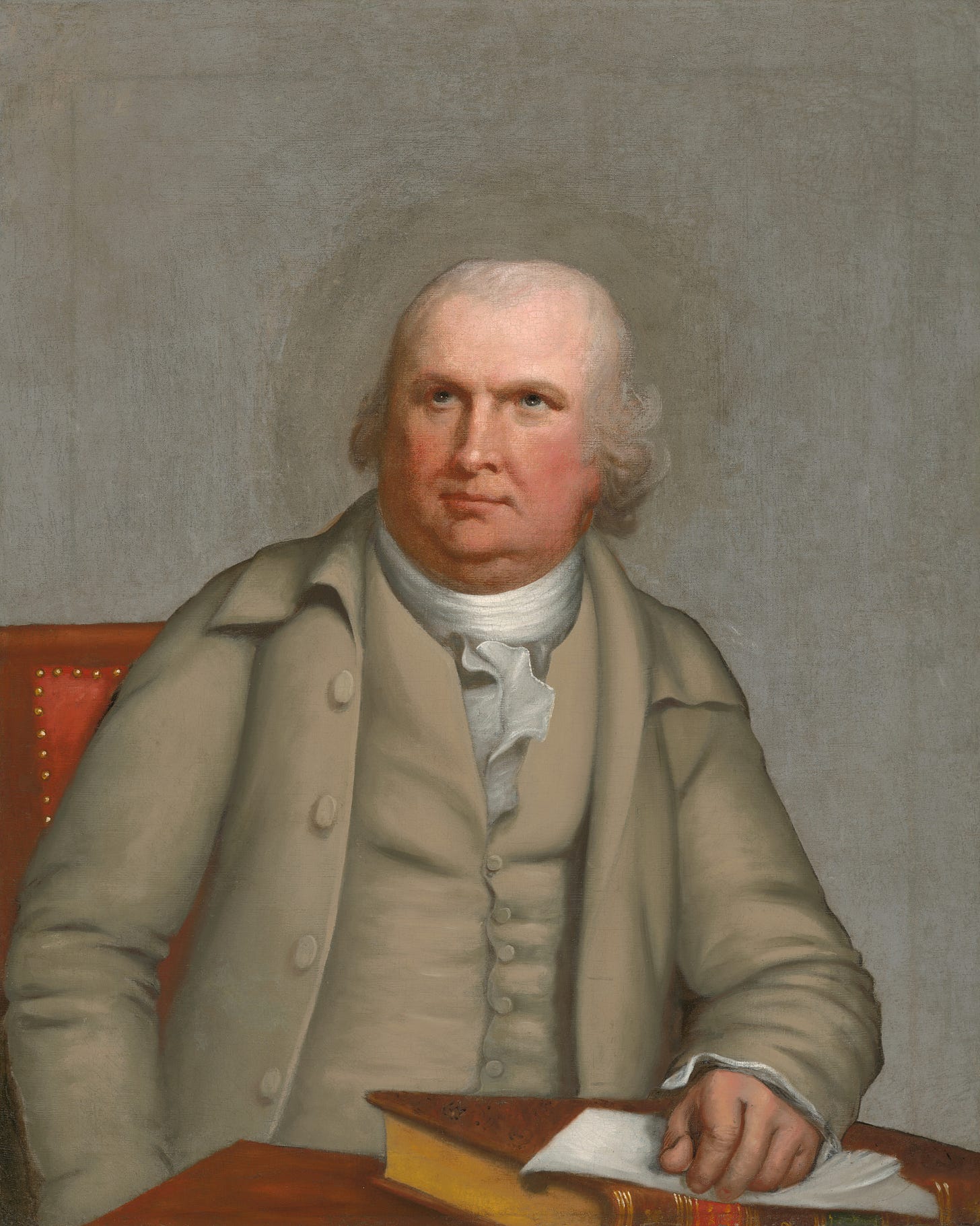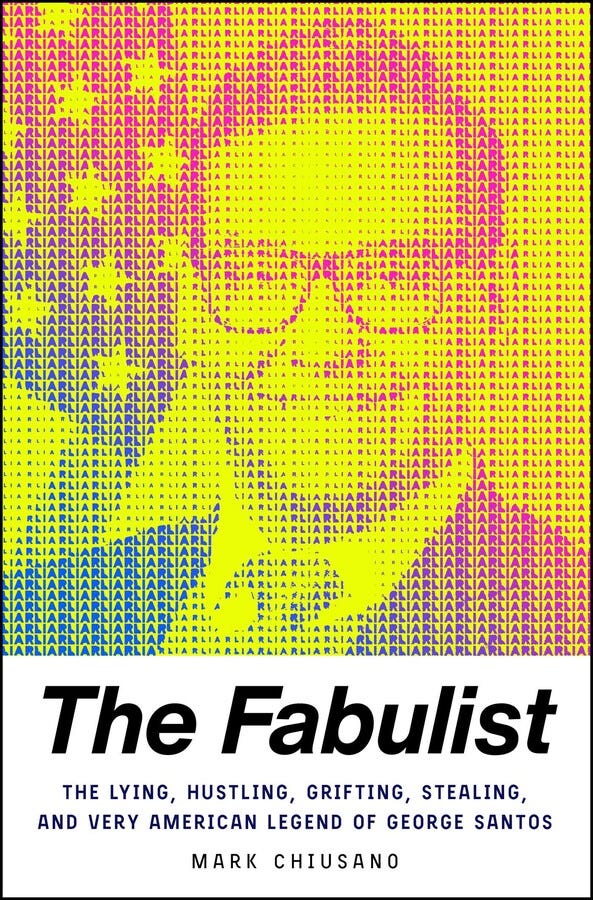For Fraud and Country
From Robert Morris to George Santos, American stories of self-dealing, corruption, and grift.
The Fabulist
The Lying, Hustling, Grifting, Stealing,
and Very American Legend of George Santos
by Mark Chiusano
Atria/One Signal, 320 pp., $28.99
WILLIE SUTTON ROBBED BANKS BECAUSE “that’s where the money is.” George Anthony Devolder Santos came to politics for much the same reason. He found plenty of marks and swindled gleefully. Along the way, almost by accident, he accomplished the most important thing a politician can accomplish: He won a competitive election. So ended his idyll. He was on his way to infamy and a jail sentence before he ever took office.
To be fair to Santos, his ambitions went beyond money, and so political office offered him more than a bank (or a mere crypto scam) could. As described in The Fabulist, Mark Chiusano’s biography of the disgraced former representative, Santos had an insatiable desire for class status and social esteem that he never figured out how to chase through honest means. Politics offered an outlet for his ambition and energy, his talents for flattery and bullshit, and his dash of real charisma. Is it not a story as old as politics itself for such a young man in a hurry to acquire power and prestige to quickly fall into some measure of self-dealing and corruption?
Unfortunately, Santos’s saga really does mark something new in the annals of America’s Congress. Many of his predecessors in malfeasance have, in their zeal for their district’s interests, gotten carried away with a sense of their own righteousness, which has made them willing to pad their own pockets as they served their voting public. But, though Santos won the right to represent the citizens of New York’s 3rd Congressional District, he seemed to barely register their affairs or concerns at all. He occasionally held forth on topics of interest to Long Islanders, but their lives never seemed as real to him as those of his fans and haters on social media.
If politicians are susceptible to corruption, their succumbing to it does in a strange way at least testify to the vitality of politics, even if the testimony is perverse. But Santos was not really a politician at all—he barely even played one on TV. Instead, he was an arriviste, a reply guy, an aspiring influencer who believed his routine deserved to be elevated to the big time because it matched the vibes. He was a true, all-American grifter. And to his credit, he understood the vibes perfectly.
It should deeply embarrass all of us that he ever served in the House of Representatives, and we may hope that his year there will remain a unique episode in the institution’s history. But there are good reasons to worry it may not be.
A DIVISIVE FORMER PRESIDENT’S OMNIPRESENCE in the news has lately resensitized Americans to corruption. As a result, prominent members of the House of Representatives have been spending much of their days trading shots about whether the Trump Hotel or the Biden Crime Family is more damnable. This is not an appealing feature of our politics, but neither is it a new one. Going back to the Founding, our country’s leading political figures have perennially accused each other of distorting their public offices to private ends. Many times the accusations were just—and yet some of those rightly accused of self-dealing were still indispensable public servants.
Consider Robert Morris. Perhaps the richest man in the thirteen colonies when the American Revolution began, Morris’s wealth derived largely from merchant shipping and various financial innovations incident to that business. The Philadelphian threw himself into the war effort, including as one of Pennsylvania’s representatives in the Second Continental Congress. There he and his business partner, Thomas Willing, led the Secret Committee of Trade, which was tasked with buying and delivering weapons for the new nation’s army. The committee had lots of work for merchant shippers, and many of its contracts went to Morris, whose public service at the center of the Revolution thus mixed freely with his private affairs. As the financial historian Thomas McCraw put it, “He managed to negotiate bargains that nobody else in the government could have executed. In hundreds of individual transactions, Morris sometimes profited personally, but often he did not.”
One can’t help but marvel, with a mixture of admiration and queasiness, at Morris’s ability to adapt to circumstances. As a shipper, he was outspoken against the horrors of privateering; but, soon enough, in response to suffering serious losses from privateers, he became an investor in many of his own. “I conceive myself perfectly justifiable in the Eyes of God or Man to seek what I have lost, from those that have plundered me,” he reasoned, notwithstanding the unlikeliness of gaining restitution specifically from those who had wronged him. Meanwhile, close by the Pennsylvania Statehouse, Morris acquired a large house in 1781 that he then gave to George Washington in 1790. It served as the president’s residence for a decade before the government decamped to the new capital on the Potomac. Government money came in on one side; lavish gifts to the new government came out the other.
Some of Morris’s contemporaries saw him as a war profiteer, but most felt that his able service justified putting aside any concerns about graft. Congress unanimously appointed him as the nation’s superintendent of finance in 1781—effectively asking him to personally shoulder the responsibility for ending inflation, keeping America’s debt manageable, and generating sufficient revenues to sustain the war effort. To this end, he persuaded Congress to charter the Bank of North America, the first national bank of the fledgling United States. The aptly named Willing was tapped to serve as president of the venture.
Morris had much to gain from these arrangements, but his fortune was on the line. The nation’s finances were a mess, and while his work as finance superintendent did stave off catastrophic failure, it achieved neither stability nor private enrichment. Morris resigned his post at the end of 1784, and his position was not filled again. As a private citizen, he continued to trade on his connections as he went into land speculation, much of which was marred by fraud. He overextended and then ruined his fortune, landing in debtor’s prison in 1798 until the Bankruptcy Act of 1800 allowed him a way out from under his debts. He died, an uncelebrated pauper, in 1806.
Morris’s complicated conflicts of interest and ignominious ending have much to do with his obscurity today. But his contributions to our young nation were truly singular, and he ought to be remembered. It was quite a thing for the richest man in the new nation to mobilize his shipping fleet and his capital on the new nation’s behalf. If he hoped to expand his connections and fortune thereby, well, perhaps that is the cost of drawing vaulting ambition into the public service.
SO CORRUPTION, IN MODERATION, and attached to sufficiently talented and public-spirited officials, need not be toxic. Perhaps something similar can be said for fraud; in the right context, it can be benign or even constructive. Consider the celebrated case of the con artist Anna Delvey (née Sorokin).
As an attractive, confident, 22-year old Russian émigrée to Germany, she transplanted herself to New York (by way of London and Paris) in 2013 and appointed herself as an arbiter of cultural life in the city. She fabricated a new name and oligarch-adjacent family background and apparently had a gift for sniffing out what was fashionable. With remarkable chutzpah, she conceived of an “Anna Delvey Foundation” that would provide a venue for the city’s tastemakers in art, fashion, and high society to mingle, and got some way toward realizing this vision. Had she succeeded, she would have effectively transcended her own fraud to produce something authentic. In the influencing business, buy-in from other influencers is the only currency.
Of course, Delvey was also underwriting her own lifestyle through a variety of regular-old larcenies, petty and grand. She went to jail for kiting checks and skipping out on colossal hotel bills, leaving behind a long series of betrayed and hurt confidantes. The Netflix version of her story, Inventing Anna, leaves no doubt that she uses people with little regard for their humanity.
Still, her victims certainly have a good story to tell—and some of them have gotten sizable sums for telling it. Delvey herself was paid enough for the rights to her life story to settle many of her bad debts, and she seems well on her way to live out her life more happily than Robert Morris did, complete with a reality television show documenting the dinner parties she throws in her apartment while under house arrest on parole. She was a fraud, but now she is authentically “famous for being famous,” with as much right to that dubious distinction as most other social media darlings. Our celebrity culture has a place for her, as surely as the nineteenth century had a place for P.T. Barnum.
THE SAME OUGHT NOT TO BE TRUE OF SANTOS. Whereas Delvey sold her magnetism as its own product, and thus achieved a kind of honesty in her fraud, Santos sold his persona as an emanation of the 3rd Congressional District of New York, when it was never really anything of the sort.
As someone who wants to see Congress revived as a serious institution, I am second to none in my loathing for Santos; I’ve scolded people for giving him their continued attention, and didn’t particularly want to learn more about him. But Chiusano’s book called out, siren-like, from the new books section of my local public library, and I succumbed.
What I learned is that my idea of Santos had been much too charitable—while I had known of many of his particular frauds, I had erred by believing that the mundane reality underneath must have contained something substantial. Instead, in Chiusano’s account, almost all of Santos’s life is vaporware.
His early years in Jackson Heights, Queens, being raised by working-class Brazilian immigrants, were real enough, and difficult. His parents split up, there was little money. He dropped out of high school and got his GED. Knowing he was gay from a young age could not have been easy.
Then came a series of remarkable escapades in Brazil, which Chiusano paints as formative. In Niterói, across Guanabara Bay from Rio de Janeiro, Santos insinuated himself into the orbit of a well-known drag queen and played the eager pupil. As “Kitara Ravache” he failed to capture coveted gay beauty queen awards, but his persona won him real admirers; there was some truth in the play-acting.
The time in Brazil opened the door to more desperate pursuits, through—of all things—bingo. Santos and his mother frequented bingo halls that were serious gambling establishments rather than church-lady recreations. They became inseparable from a woman willing to fritter away her inheritance in days-long bingo benders. Having developed a taste for spending money he didn’t have, Santos, like Delvey, soon turned to spending bad checks (in his case, purloined from a recently deceased elderly man whom his mother had cared for). Through bad luck, he was caught and charged with fraud. Rather than face the charges, he fled home.
Once more in Queens in 2011, Santos took a last stab at up-and-up authenticity, working as a call-center operator for the Dish Network. His Portuguese language skill and ability to upsell customers served him well. If his coworkers doubted his tall tales, they seem to have genuinely regarded him as personable and talented. He was good at his job. But it was a grind, and he soon left it in favor of full-time miscellaneous scheming.
Of course Chiusano can’t penetrate all of Santos’s activities, but he uncovers a dizzying variety. Santos sold himself into a marriage to help a Brazilian immigrant get citizenship. (In this, at least, he showed persistence: The marriage lasted seven years and she became a citizen, though the couple seem to have had little to do with each other during that time.) He helped others with sham marriages fake evidence of long-running relationships. While failing to pay his own rent, he rented out rooms from his apartment and apparently stole from his renters. He probably stole from his mother. He created a fake charity, “Friends of Pets United,” donations to which went straight into his pocket; he bought fancy puppies in Amish country with a bad check and resold them. In perhaps his most infamous scam, in 2017, he raised $3,000 for cancer treatment for a disabled veteran’s beloved canine companion, only to keep the money for himself.
All this is heartbreakingly shabby. How could someone with this background end up in the Capitol, rather than Rikers? In 2020, Santos upped his game as an employee of Harbor City, a slick operation that purported to use “big data, artificial intelligence, and machine learning” to sell targeted online advertising. It was actually a garden-variety Ponzi scheme. The boss at Harbor City aimed high in choosing marks, and thus introduced Santos into the world of wealth. When the firm inevitably buckled under the weight of impossible promises, Santos spun out his own business, the Devolder Organization, which introduced rich people to each other and collected finder’s fees when they did deals.
This network of wealthy contacts would offer Santos a base for launching a political campaign he expected to be lucrative, if not successful. They could be tapped for campaign and PAC contributions, often for tens of thousands of dollars at a time. Chiusano observes that “because this money is basically not real to such donors, they do not really even have to understand where it’s going.” Santos put his call-center skills to work as a political fundraiser, and had some real success. Meanwhile, he charged all kinds of expenses to his campaign and found crude ways to skim, including making record numbers of $199.99 purchases (below the $200 threshold requiring receipts). And he became partners in crime with his campaign treasurer, Nancy Marks; they set up a firm that could bill the campaign, and she helped him fake a $500,000 loan that went a long way toward convincing potential donors that Santos was a self-funding force to be reckoned with.
Santos carried out parts of this operation in 2020 without any problem. He was the GOP’s sacrificial lamb in a blue district, and so his 44 percent showing (just a point worse than Trump performed in that district) against an incumbent congressman seemed unremarkable, even respectable. With experience, Santos was ready to run a better grift in 2022.
But fate dealt him a curveball when New York’s Court of Appeals threw out the state’s new, Democrat-favoring gerrymander. Coupled with the retirement of the incumbent, Tom Suozzi, suddenly Santos was the GOP frontrunner in a winnable open seat. Former congressman Lee Zeldin ran a strong (if losing) campaign for governor, energizing Long Island Republicans. Santos was in his element inveighing against COVID nannyism and out-of-control immigration, putting himself forward as his party’s answer to Alexandria Ocasio-Cortez. He rode the GOP wave (real in New York and Florida, if absent elsewhere) to a 54-46 victory. And at that point, the serious scrutiny of journalists asking who the heck this guy was finally caught up to him. His legislative career, such as it was, all played out under a cloud, and ought to be understood as one long social media messaging exercise—as an official invested with real power, Santos didn’t have a clue. He denied everything, showed up as a reliable vote for Republican leaders—and apparently found ways to steal from his colleagues as he waited for the other shoe to drop.
Chiusano wants to draw a direct line from Trump to Santos’s political turn, saying that the president “pretended to be rich and powerful, until he was.” Whatever one thinks of Trump and his relationship with the truth, that is a gross mischaracterization. He really was heir to a significant fortune, a mover and shaker in New York real estate, the savior of Central Park’s ice rink, and a bestselling author, long before he ever seriously entered reality television or politics. Like Robert Morris, Trump was a famous man of affairs who mobilized his resources to enter public life.
Santos’s rise illuminates different defects of our political moment: our devaluing of organic communities, our delight in unusual appearances for their own sake, our political parties’ desperate desire for self-funding candidates, and, most damningly, our amnesia as to the value of dynamic political representation. The last of these faults extends into Congress itself, where members often feel that they have been demoted to glorified telemarketers and vote-casters. If that is all that being a member of the House is about, then perhaps Santos was as well qualified as the next person—or, given his experience hawking Dish Network packages, maybe even more.
If opinions of our legislature remain so low, and personal character continues to seem so unimportant to the job relative to a willingness to brashly denounce official enemies, we should expect more Santoses in the years to come. They probably won’t be nearly so cuddly.







